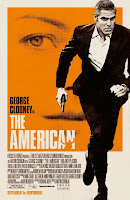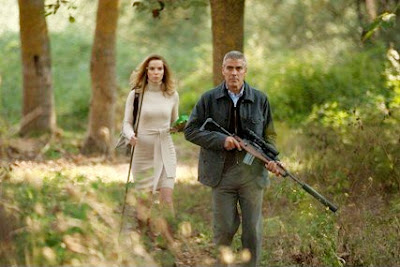 The American emulates European filmmaking, and almost feels ripped straight from the film industry of 1960s Italy, maybe France. George Clooney plays Jack (or is it Edward?), the titular American residing in a medieval Italian village. He's given a job to construct a gun for the mysterious Mathilde (Thekla Reuten, the best part of the film); during his stay, he also meets the beautiful prostitute Clara (Violante Placido).
The American emulates European filmmaking, and almost feels ripped straight from the film industry of 1960s Italy, maybe France. George Clooney plays Jack (or is it Edward?), the titular American residing in a medieval Italian village. He's given a job to construct a gun for the mysterious Mathilde (Thekla Reuten, the best part of the film); during his stay, he also meets the beautiful prostitute Clara (Violante Placido).To say more would ruin the film's deliberately structured plot, as not much actually happens in The American. Director Anton Corbijn, famed photographer and director of 2007's Control, has put a deliberate spin on what could have been a big spy thriller - this is an existential piece, a look at a man struggling with his place in the world. Sure, a spy or hitman with a conscious is nothing new, but Corbijn's careful execution elevates The American above cliched retread.
The film's opening sequence kick-starts the action, perfectly blurring Jack's morality (followed by a spectacularly designed opening credits sequence). One of the greatest things about The American is that it always feels like a larger spy movie that has been zeroed in. There is so much happening on the periphery of Jack's life and on this single job, things never fully explained to the audience; this gives Jack's journey a focused feel, like Corbijn has zoomed in on the elements of the story that intrigue him the most. George Clooney is stripped of his charm, subdued to an almost stoic level; Clooney, not one of my favorite actors, works wonderfully here, barely letting his emotions ripple across his face through most of the film.
While Clooney's take on Jack is an interesting turn for the actor, the film itself ends up too cold and rigid to become something truly remarkable. The pace of the film crawls along like a snail; in his adherence to European filmmaking, Corbijn has made a film that keeps the viewer at arm's length for far too long. Masterful European thrillers, such as Micahel Haneke's Caché, trick the audience such that the film moves at such a measured pace, and with such cold deliberation, that you're completely unprepared when the film suddenly slaps you across the face.
The American lacks such a punch. However, the film's final act is perfectly executed, finally letting the film's tension unravel; however, the film spends far too long churning the action instead of building in preparation for the finale. The final act puts together the pieces, finally elevating the film, giving meaning to its detailed focus. The cinematography is absolutely gorgeous, and every single shot drips with European elegance. The film's parting shot is breathtaking, in both style and content; it draws upon a motif built throughout the film, an understated metaphor that grows beautifully.
Despite it's chilly exterior, The American works because it trusts its audience: there are no flashbacks to spell out important moments, no expository dialogue to close up loose ends, no movement in the orchestration (unobtrusive and wonderful work by Herbert Grönemeyer) that screams how important a single line of dialogue is; there is a pivotal statement that spins the film and its characters, but Corbijn doesn't give it any added attention. Ultimately, this is a movie about a man, not a spy, and it's bound to be extremely polarizing. The American is almost unbearable slow in parts, but the film rewards the viewer's attention, as its cold, emotionally restrained focus unfolds a man's inner turmoil before your eyes. B




No comments:
Post a Comment